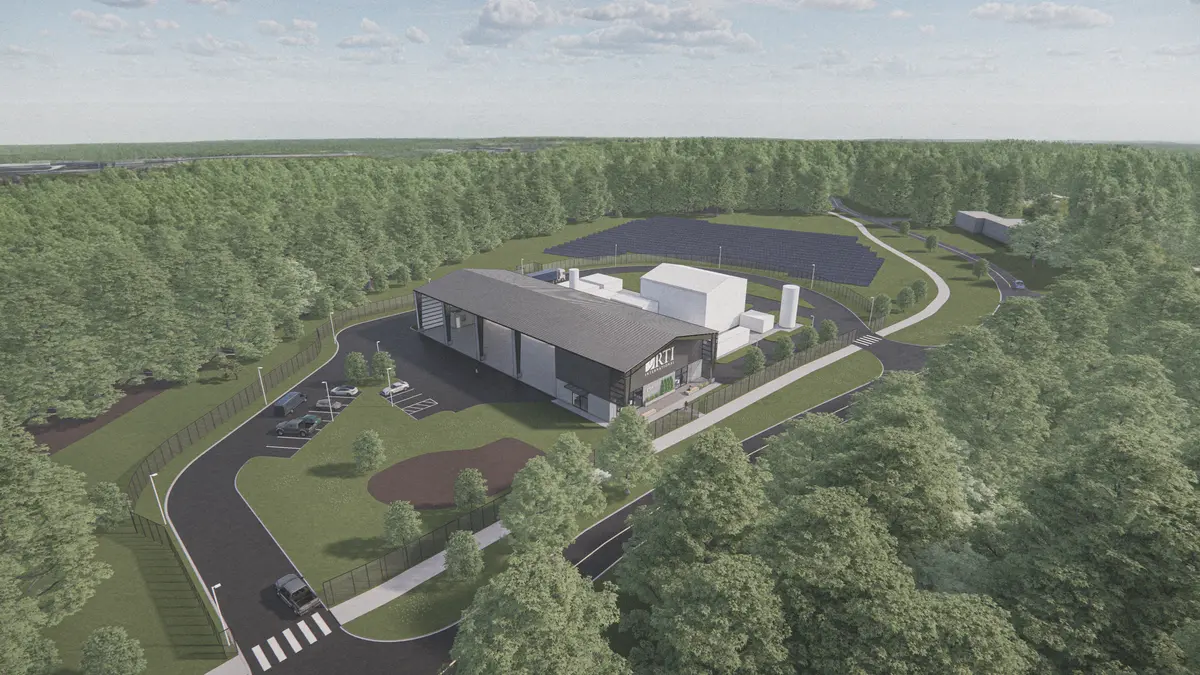
Rendering of the new RPX facility that will open in 2026.
This blog is a part of a series on Trellis Impact 25, an event addressing climate technologies, biodiversity, and clean energy. Read the full series here.
The climate tech industry emerged in the 2000’s as society responded to the threat of global warming, spurring investment in startups with renewable energy technologies like solar photovoltaics and biofuels. The first climate tech “wave” largely failed due to logistical and financial challenges in scaling development and manufacturing of complex physical technologies.
While the second climate tech wave of the early 2020’s stimulated the development of a more robust innovation ecosystem, many deep tech startups continue to struggle to reach commercialization.
Challenges Climate Tech Startups Face Along the Journey to Commercialization:
Discovery State (Through Pilot State)
Disjointed support: Startups move from one support program (e.g., accelerator) to another, often in different regions and with gaps in between.
Lack of ecosystem connectivity: Even in regions with ample technology development, business, and financial resources, potential connections and strategic matches can go unrealized without the investment in people with skills and knowledge to make high-value connections as well as programming to facilitate interaction.
Inadequate planning for demonstration & deployment: Lack of preparation for this stage can delay funding for startups because key risks are not adequately resolved.
Demonstration & Deployment Stage
Gaps in the capital stack: There has been a lack of financial instruments and funders with expertise and investment criteria that match the unique risk profile and long timeframe for the commercialization of deep tech, resulting in many startups remaining stuck in growth stage, unable to secure capital to fund demonstration and FOAK commercial-scale projects.
Difficulty finding and managing demonstration partners: Demonstration-stage startup founders typically do not have the background or connections to initiate and navigate partnerships.
Inadequate ecosystem support: Existing accelerator and grant programs do not include adequate partnership focus and “hand holding” to overcome startups’ gaps in expertise-implementing infrastructure projects and lack of industry connections.
Closing the Innovation and Access Gap for Climate Tech Investment
Fortunately, the deep tech ecosystem is made up of some of the most capable problem solvers around, and leading players are working hard to close these gaps with innovation and access to expanded entrepreneurial support services:
- Catalytic capital sources (foundations, family offices, and state governments) are stepping to fill the funding gap for energy technologies.
- Financial innovations have emerged:
- Elemental Impact and Wilson Sonsini recently announced the Deployment-Simple Agreement for Equity (D-SAFE) investment vehicle, which leverages a well-known funding agreement structure to de-risk up-front activities for demonstration projects like securing permits, project design, budgeting and contracting, and community engagement.
- Investors have created blended finance vehicles that enable foundations and family offices to catalyze market-rate capital investment in deep tech demonstration projects.
- Ecosystem Support Organizations offer program content to meet the needs of deep tech startups at different stages:
- Discovery:
- Discovery-stage fellowship programs like Breakthrough Energy Fellows and Activate provide early nondilutive financing and mentorship to promising researchers to launch impactful new startups.
- Development:
- Accelerator programs like New York’s For Climate Tech program provide access to industry executives, government & regulatory experts, supply chain partners, and other resources to prepare manufacturing startups for scaleup.
- Demonstration:
- Developers: project developer-as-a-service firm Mark1 has teamed with Rocky Mountain Institute, Third Derivative, and Deep Science Ventures to build an ecosystem designed specifically to overcome the challenges late-stage startups face with expertise and connections to engineering, procurement, and construction (EPCs), investors and other stakeholders, with a goal of developing FOAK projects.
- Government: the Critical Mass program in Massachusetts provides custom support and connections for late-stage deep tech startups looking to demonstrate their technologies at scale.
- EPC’s like Black & Veatch, Fluor, and Halliburton’s Naviscale operate or sponsor accelerator programs that leverage their expertise, supply chains, and industry connections to accelerate commercialization of growth-stage startups and prepare them for demonstration and FOAK projects.
- Node Climate is an ecosystem platform coordinating stakeholders to facilitate successful first-of-a-kind climate projects.
- Discovery:
RTI's Role in Deep Tech Commercialization and Climate Tech Development
RTI has worked in energy technology development for more than 30 years in its laboratory facilities in Durham, NC, transitioning technologies from concept to lab- and bench-scale systems. In recent years, we opened our facility, the RTI Pilot Xcelerator (RPX), to clean energy startups, conducting successful pilot projects with Syzygy Plasmonics, Lydian Labs, and Aether Fuels.
RTI Pilot Xcelerator Expands to Support Commercialization Efforts
This October we broke ground on an expansion of the RPX to be completed in 2026. It will double the space for technology demonstration, expanding to 25,000 square feet, and add 3,000 square feet of office space.
Another planned expansion will add a 1-megawatt PV solar array to demonstrate renewables-to-X technologies. The RPX is designed as a true “plug and play” facility with utilities and engineering support to enable startups in the chemicals and materials space to conduct pilot projects without having to invest in the balance of plant, reducing cost and accelerating development.
RPX's Deep Tech Commercialization Services
The RPX includes a comprehensive suite of deep tech commercialization services, leveraging RTI’s decades of experience in technology commercialization, innovation ecosystem building, environmental impact and regulatory analysis, and economic analysis, including:
- Market intelligence, customer discovery, and go-to-market strategy
- Supplier and partner scouting
- Regulatory analysis
- Techno-economic analysis
- Life-cycle analysis
- Community benefits assessment
- Bankability assessment
For climate tech startups between the development and demonstration phases, RTI offers comprehensive deep tech commercialization support. Through collaboration with project developers, EPCs, and investors, we intend to ensure that our startup support offerings facilitate a smooth handoff to developers and EPCs and provide a foundation of commercial readiness that will position RPX graduates for investment in demonstration and FOAK projects.
Opportunities to learn more about the RTI Pilot Xcelerator: RPX team members will be on hand to discuss more about the facility at the upcoming Trellis Conference in San Jose, CA, October 27-29. Please stop by the RTI booth in the exhibit hall to learn more.

